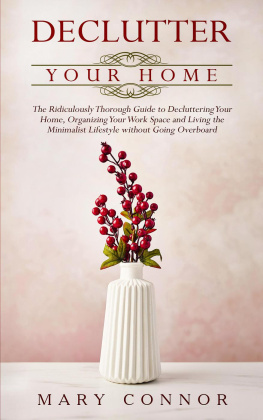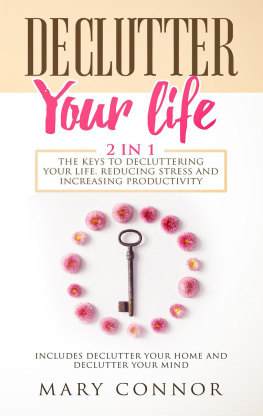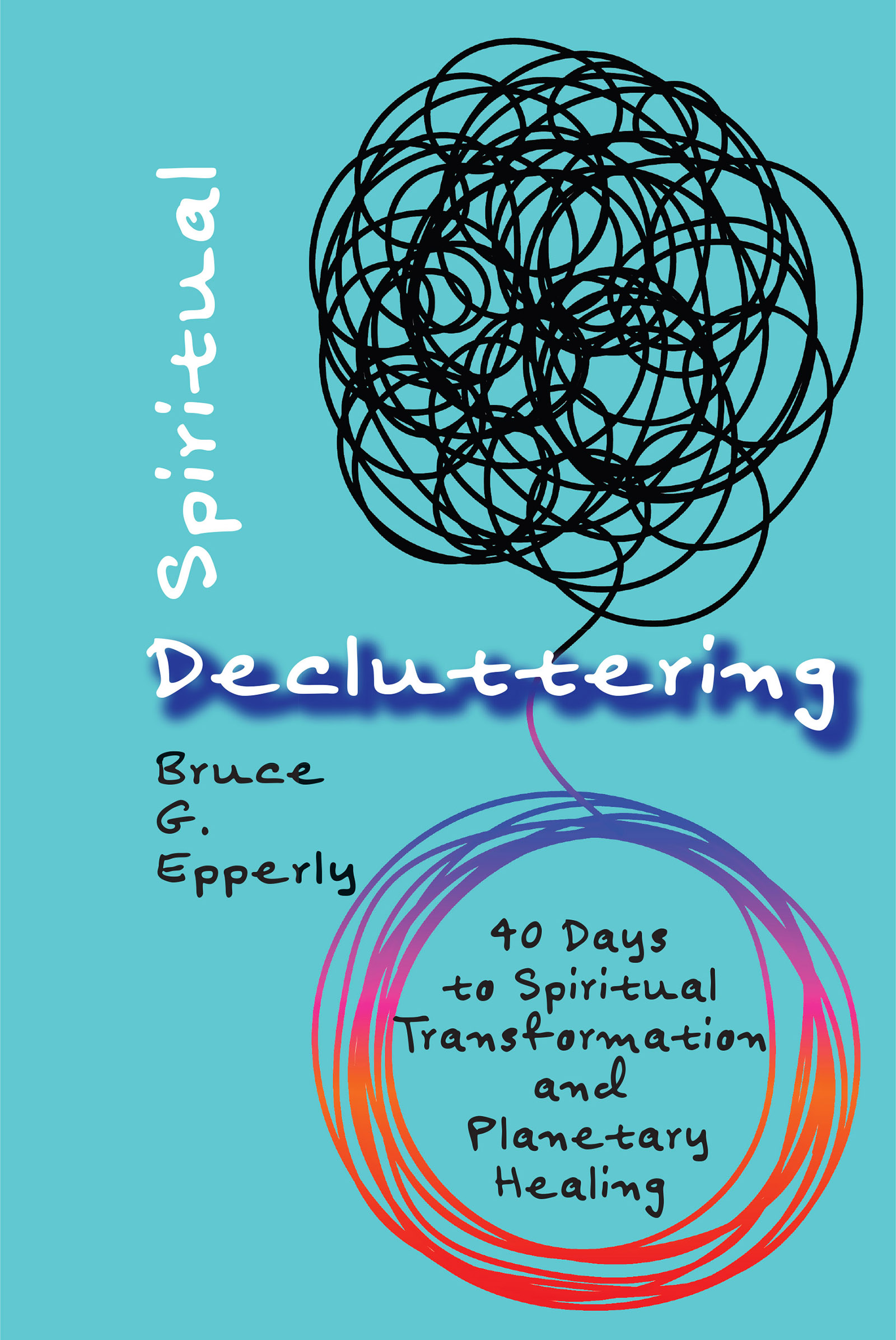Spiritual Decluttering
40 Days to Spiritual Transformation and Planetary Healing
Bruce Epperly
Energion Publications
Gonzalez, FL
Copyright 2019, Bruce G. Epperly
All Rights Reserved
Unless otherwise indicated, all Scripture quotations are from the New Revised Standard Version Bible, copyright 1989 by the Division of Christian Education of the National Council of the Churches of Christ in the U. S. A. Used by permission. All rights reserved.
eISBN: 978-1-63199-680-1
ISBN10: 1-63199-643-6
ISBN13: 978-1-63199-643-6
Library of Congress Control Number: 2019932430
Energion Publications
P. O. Box 841
Gonzalez, FL 32560
energion.com
pubs@energion.com
Table of Contents
The Spirit of Simplicity
Chapter One
Tis A Gift To Be Simple
Do you want a more abundant life? Do you want to live more fully and faithfully? Do you want to find a way to work hard and live well, to be committed to great causes and also have time for faith, family, and friends? Do you want to work to change your world, while experiencing calm amid the struggle? Do you want to live more simply and lessen the complexity of your life as part of your responsibility to the well-being of the planet and its peoples? How we answer these questions can be a matter of joy and sorrow, relationship and alienation, and life and death.
While decluttering our lives seems like a good idea, simplicity is far from simple for many of us. Caught in the complexities of clutter of mind, body, spirit, work, and environment, many of us need a pathway to spiritual decluttering. We need to simplify our lives as a way of discovering what is truly important. We need to get rid of the clutter so Gods light can shine through. In the words of the poet William Wordsworth, many of us admit:
The world is too much with us; late and soon,
Getting and spending, we lay waste our powers;
Little we see in Nature that is ours;
We have given our hearts away, a sordid boon!
We know that we need to simplify our lives, not just in terms of the clutter in our homes and offices, but the cumber that weighs down our spirits. We would like to experience greater joy, freedom and creativity. We want to let go of unnecessary obligations so we can experience greater focus, vitality, and love.
A good life involves the interplay of rest and activity and contemplation and action. Activity energizes and delights and brings new possibilities into the world. God gave each of us unique gifts and in embodying these gifts in the world, we bring beauty to the earth and add to the joy of creation. As the philosopher Alfred North Whitehead asserts, the process is the reality. We are meant to be active and push the limits of possibility. Without action, our minds, bodies, and spirits rust. We lose our growing edge. Our energy is depleted and our lives become uninteresting. Yet, we also know that too much activity and busyness can wear us down and distract us from what is truly important in life. A saying attributed to Carl Jung rightly addresses the dangers of a life solely devoted to action: busyness is not of the devil; busyness is the devil.
A good life also involves the interplay moments of reflection and rest. We need to refresh our spirits and rejuvenate our bodies. We need time apart to reclaim our spiritual GPS and gain perspective on our daily lives and civic involvements. Stillness and solitude nourish the spirit and give us perspective. Yet, rest without action, and contemplation without commitment, also depletes our energy, blunts our vision, and renders us so heavenly minded that we are no earthly good. Finding that right blend of action and contemplation is essential to a creative, meaningful, and socially responsible life.
A good life is characterized by the interplay of calm, vitality, and change. There are many paths to personal wholeness, and no path fits all persons nor all times of our lives. The balance between rest and activity is constantly shifting. The path we take forward depends on a lively integration of personal gifts, personality type, age, environment, vocation, and relationships.
The great religious traditions note the importance of contemplation in a life committed to action. An insightful reading of the gospel account of the relationship of two sisters, Mary and Martha, provides a vision for holistic living.
As Jesus and his disciples were on their way, he came to a village where a woman named Martha opened her home to him. She had a sister called Mary, who sat at the Lords feet listening to what he said. But Martha was distracted by all the preparations that had to be made. She came to him and asked, Lord, dont you care that my sister has left me to do the work by myself? Tell her to help me!
Martha, Martha, the Lord answered, you are worried and upset about many things, but few things are neededor indeed only one. Mary has chosen what is better, and it will not be taken away from her. (Luke 10:38-42)
At first glance, Martha gets the short end of the deal, relationally and biblically. Her efforts, so necessary to the dinner party, appear to be downplayed and criticized by Jesus. A deeper reading of this passage tells another story. Marthas work is valuable but Martha is busy, so busy that anxiety clouds her enjoyment of Jesus presence. She is so distracted by her agenda and the tasks in front of her that she forgets to welcome her guest. Many of us can relate to the activist Martha. She wants things just right. She wants to be in control of the outcome. She wants give Jesus the respect he deserves as a reflection of her affection for him. Yet, she is so anxious to be the perfect hostess that she forgets the reason for her preparation to be with Jesus, enjoy his company, and share in a good meal and lively conversation. The point of the story is found in Jesus counsel to her, you are worried and upset about many things, but few things are needed only one. Martha is so distracted by the trees of preparation that she forgets the forest of hospitality. Martha needs to learn that spiritual simplicity, being present in this unique and holy moment, does not mean laziness or disengagement, but a sense of what is truly important over the long haul and in this fleeting moment of time.
As I imagine the story of Jesus interaction these sisters, Jesus also has a few words for Mary. He delights in her relational attentiveness, but after a while he invites her to get to work. Say, Mary, why dont you give your sister some time with me? Can you make sure the tables set and pour me another glass of wine? Maybe, you and Lazarus can clean up after dinner, so Martha and I can go on a walk in the starlight. After we get back, Ill help out, too!
Jesus lived a dynamic and busy life, but Jesus was also present in the moment. He constantly balanced activity and rest, and then moved forward to the next encounter with focus, intentionality, and compassion. Even interruptions, and Jesus life was full of unplanned meetings, didnt take Jesus off course. Marks Gospel describes a day in the life of Jesus:
As soon as they left the synagogue, they entered the house of Simon and Andrew, with James and John. Now Simons mother-in-law was in bed with a fever, and they told him about her at once. He came and took her by the hand and lifted her up. Then the fever left her, and she began to serve them. That evening, at sunset, they brought to him all who were sick or possessed with demons. And the whole city was gathered around the door. And he cured many who were sick with various diseases, and cast out many demons; and he would not permit the demons to speak, because they knew him.












